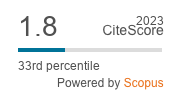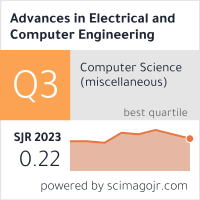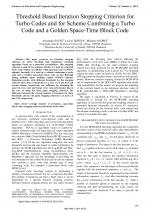| 1/2014 - 21 | View TOC | « Previous Article | Next Article » |
Threshold Based Iteration Stopping Criterion for Turbo Codes and for Scheme Combining a Turbo Code and a Golden Space-Time Block CodeSAVIN, A. |
| Extra paper information in |
| Click to see author's profile in |
| Download PDF |
Author keywords
average number of iterations, space-time block codes, stopping criterion, threshold, turbo codes
References keywords
turbo(15), decoding(13), stopping(11), codes(8), communications(7), letters(6), criterion(6), iterative(5), soft(4), isscs(4)
Blue keywords are present in both the references section and the paper title.
About this article
Date of Publication: 2014-02-28
Volume 14, Issue 1, Year 2014, On page(s): 139 - 142
ISSN: 1582-7445, e-ISSN: 1844-7600
Digital Object Identifier: 10.4316/AECE.2014.01021
Web of Science Accession Number: 000332062300021
SCOPUS ID: 84894607425
Abstract
This paper proposes an iteration stopping criterion for turbo decoding with Benedetto's decoding algorithm based on a posteriori probabilities. This stopping criterion is used in two schemes. Firstly, it is used in a classical turbo code scheme on additive white gaussian noise (AWGN) channel. Secondly, it is used in a scheme combining a turbo code and a Golden space-time block code on fast Rayleigh fading multiple input multiple output (MIMO) channel. Simulation results with different thresholds for the stopping criterion show that a threshold of 1.2 and 1.4 in the first and second scheme, respectively, are sufficient for obtaining the same bit error rate and frame error rate performance like in the case of using the ideal genie stopping criterion. The difference between the average number of iterations for these thresholds and for the genie stopping criterion is at most 1.5 and 1.25, respectively. |
| References | | | Cited By «-- Click to see who has cited this paper |
| [1] C. Berrou, A. Glavieux, and P. Thitimajshima, "Near Shannon limit error correcting coding and decoding: Turbo-codes", IEEE Proceedings of International Conference on Communications ICC 1993, Geneva, Switzerland, vol. 2, pp. 1064 -1070, 23-26 May 1993. [CrossRef] [2] S. Benedetto, D. Divsalar, G. Montorsi and F. Pollara, "A soft-input soft-output maximum a posteriori (MAP) module to decode parallel and serial concatenated codes", TDA Progress Report 42-127, Nov. 1996 [3] S. Benedetto, D. Divsalar, G. Montorsy and F. Pollara, "A soft-input soft-output APP module for iterative decoding of concatenated codes", IEEE Communications Letters, vol.1, no.1, pp. 22-24, Jan. 1997. [CrossRef] [Web of Science Times Cited 371] [SCOPUS Times Cited 467] [4] P. Robertson, E. Villebrun and P. Hoeher, "A comparison of optimal and sub-optimal MAP decoding algorithms operating in the log domain", IEEE Proceedings of International Conference on Communications ICC 1995, Seattle, Washington, pp. 1009-1013, June 1995. [CrossRef] [5] K. Amis, G. Sicot and D. Leroux, Reduced complexity near-optimal iterative receiver for Wimax full-rate space-time code", 5th International Symposium on Turbo Codes and Related Topics, Lausanne, pp. 102-106, 1-5 Sept. 2008. [CrossRef] [Web of Science Times Cited 4] [SCOPUS Times Cited 8] [6] A. Savin and L. Trifina, "Scheme combining a turbo code and a golden space-time block code with different interleavers", IEEE International Symposium on Signals, Circuits and Systems ISSCS 2013, Iasi, Romania, pp. 37-40, 11-12 July 2013. [CrossRef] [Web of Science Times Cited 1] [SCOPUS Times Cited 1] [7] L. Trifina, D. Tarniceriu and H. Balta, "Threshold determining for minabsLLR stopping criterion for turbo codes", Frequenz, vol. 67, no. 9-10, pp. 321-326, Sept. 2013. [CrossRef] [Web of Science Times Cited 10] [SCOPUS Times Cited 12] [8] H. Balta, C. Douillard and M. Kovaci, "The minimum likelihood APP based early stopping criterion for multi-binary turbo codes", Scientific Bulletin of "Politehnica" University from Timisoara, vol. 51(65), no. 1-2, pp. 199-203, 21-22 Sept. 2006 [9] A. Matache, S. Dolinar and F. Pollara, "Stopping rules for turbo decoders," JPL TMO Progress Report, vol. 42, pp.1-22, Aug. 2000 [10] L. Trifina, H.G. Balta and A. Ruºinaru, "Decreasing of the turbo MAP decoding time by using an iterations stopping criterion", IEEE International Symposium on Signals, Circuits and Systems ISSCS 2005, Iasi, Romania, pp. 371-374, 14-15 July 2005. [CrossRef] [SCOPUS Times Cited 10] [11] J. Hagenauer, E. Offer and L. Papke, "Iterative decoding of binary block and convolutional codes", IEEE Transactions on Information Theory, vol. 42, no. 2, pp. 429-445, Mar. 1996. [CrossRef] [Web of Science Times Cited 1533] [SCOPUS Times Cited 1959] [12] R. Y. Shao, S. Lin and M. P. C. Fossorier, "Two simple stopping criteria for turbo decoding," IEEE Transactions on Communications, vol. 47, no. 8, pp. 1117-1120, Aug. 1999. [CrossRef] [Web of Science Times Cited 181] [SCOPUS Times Cited 244] [13] Y. Wu, B. D. Woerner and W. J. Ebel, "A simple stopping criterion for turbo decoding", IEEE Communications Letters, vol. 4, no. 8, pp. 258-260, Aug. 2000. [CrossRef] [Web of Science Times Cited 91] [SCOPUS Times Cited 130] [14] T. M. N. Ngatched and F. Takawira, "Simple stopping criterion for turbo decoding", IEE Electronics Letters, vol. 37, no. 22, pp. 1350-1351, Oct. 2001. [CrossRef] [Web of Science Times Cited 31] [SCOPUS Times Cited 52] [15] A. Taffin, "Generalised stopping criterion for iterative decoders", IEE Electronics Letters, vol. 39, no. 13, pp. 993-994, June 2003. [CrossRef] [Web of Science Times Cited 7] [SCOPUS Times Cited 9] [16] A. Shibutani, H. Suda and F. Adachi, "Reducing average number of turbo decoding iterations," IEE Electronics Letters, vol. 35, no. 9, pp. 701-702, Apr. 1999. [CrossRef] [Web of Science Times Cited 52] [SCOPUS Times Cited 68] [17] Z. Ma, W. H. Mow and P. Fan, "On the complexity reduction of turbo decoding for wideband CDMA", IEEE Transactions on Wireless Communications, vol. 4, no. 2, pp. 353-356, Mar. 2005. [CrossRef] [Web of Science Times Cited 11] [SCOPUS Times Cited 15] [18] F. M. Li and A. Y. Wu, "On the new stopping criteria of iterative turbo decoding by using decoding threshold," IEEE Transactions on Signal Processing, vol. 55, no. 11, pp. 5506-5516, Nov. 2007. [CrossRef] [Web of Science Times Cited 34] [SCOPUS Times Cited 40] [19] L. Guerrieri, D. Veronesi and P. Bisaglia, "Stopping rules for duo-binary turbo codes and application to HomePlug AV", IEEE Global Telecommunications Conference GLOBECOM 2008, pp. 2911-2915, 30 Nov. - 4 Dec. 2008. [CrossRef] [Web of Science Times Cited 2] [SCOPUS Times Cited 10] [20] D. H. Kim and S. W. Kim, "Bit-level stopping of turbo decoding", IEEE Communications Letters, vol. 10, no. 3, pp. 183-185, Mar. 2006. [CrossRef] [SCOPUS Times Cited 14] Web of Science® Citations for all references: 2,328 TCR SCOPUS® Citations for all references: 3,039 TCR Web of Science® Average Citations per reference: 111 ACR SCOPUS® Average Citations per reference: 145 ACR TCR = Total Citations for References / ACR = Average Citations per Reference We introduced in 2010 - for the first time in scientific publishing, the term "References Weight", as a quantitative indication of the quality ... Read more Citations for references updated on 2024-12-19 16:17 in 118 seconds. Note1: Web of Science® is a registered trademark of Clarivate Analytics. Note2: SCOPUS® is a registered trademark of Elsevier B.V. Disclaimer: All queries to the respective databases were made by using the DOI record of every reference (where available). Due to technical problems beyond our control, the information is not always accurate. Please use the CrossRef link to visit the respective publisher site. |
Faculty of Electrical Engineering and Computer Science
Stefan cel Mare University of Suceava, Romania
All rights reserved: Advances in Electrical and Computer Engineering is a registered trademark of the Stefan cel Mare University of Suceava. No part of this publication may be reproduced, stored in a retrieval system, photocopied, recorded or archived, without the written permission from the Editor. When authors submit their papers for publication, they agree that the copyright for their article be transferred to the Faculty of Electrical Engineering and Computer Science, Stefan cel Mare University of Suceava, Romania, if and only if the articles are accepted for publication. The copyright covers the exclusive rights to reproduce and distribute the article, including reprints and translations.
Permission for other use: The copyright owner's consent does not extend to copying for general distribution, for promotion, for creating new works, or for resale. Specific written permission must be obtained from the Editor for such copying. Direct linking to files hosted on this website is strictly prohibited.
Disclaimer: Whilst every effort is made by the publishers and editorial board to see that no inaccurate or misleading data, opinions or statements appear in this journal, they wish to make it clear that all information and opinions formulated in the articles, as well as linguistic accuracy, are the sole responsibility of the author.





